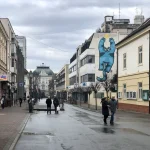A modern and transparent Bjelovar is a shining example for the rest of Croatia. From lowering surtax to making the city administration actually work for the residents, what this continental Croatian city has done should be looked upon as a drawing board for the entire country – which is lagging behind severely.
As Vecernji list/Poslovni Dnevnik/Lucija Spiljak writes on the 3rd of March, 2020, the now transparent Bjelovar has reduced surtax, the city government is fast, efficient and more clear, has nothing to hide, and wants citizens to know what they are paying into the city budget, why, and exactly where it’s going.
Bjelovar is the most transparent city in all of Croatia, which has shown the entire country how to accelerate the development of entrepreneurship and increase employment, with a free application through which all citizens have access to payments from the budget of the City of Bjelovar. This was precisely the reason for the conference entitled How Transparency Affects Entrepreneurship which was held by the City of Bjelovar in cooperation with Vecernji list and Poslovni Dnevnik at the Bjelovar Cultural and Multimedia Centre.
On this occasion, Vladimir Nisevic, Editor-in-Chief of Poslovni Dnevnik, said that there is a link between transparency and the economy and that it needs to be nurtured.
“Businessmen and citizens want to know how public money is being spent, and that should be the rule in Croatia. Therefore, us at Poslovni Dnevnik and Vecernji list want to change society and send clear and important messages about the inevitable connection between the economy and transparency,” said Nisevic during his opening speech.
The Mayor of the City of Bjelovar, Dario Hrebak, emphasised that they were no longer the only transparent local self-government united in Croatia, but that the municipalities of Omisalj and the City of Sveta Nedelja had also joined them on that highly commendable list.
He also recalled the term ABC, which means ”Anything but Croatia’‘, referring to the numerous foreign investors who were bypassing Croatia due to the dreadful bureaucracy, excessive taxes and corruption.
“If we send a strong message to citizens who have the right to know how politicians spend their money, then we’re sending out a strong message that in Bjelovar, the kuna is worth more than any other kuna invested in Croatia. The emphasis is placed on transparent behaviour and the fight against corruption. We’ve reduced surtax, the city government is fast, efficient and more clear, we’ve got nothing to hide and we want our citizens to know what they are paying into the city budget for,” stated Hrebak when discussing the commendable transparent Bjelovar, before continuing:
”Therefore, we’d like to invite investors to come and invest in the City of Bjelovar, because theirs, that is, your kuna, is worth more here than it is anywhere else in Croatia,” Hrebak said, adding that the modern economy cannot exist on the basis of the bureaucratic model of the last century.
Then, Helena Schmidt, a partner in Deloitte’s tax advisory department, presented the current state, challenges and prospects for the future of local and state tax levies.
In a one-on-one interview, Vladimir Nisevic and Davor Huic, president of the Lipa Taxpayers Association (Udruga Lipa), discussed ways to spend public money and implement structural reforms for an efficient system that actually works in the service of citizens.
Huic explained that since he had decided to engage in public activities back in 2014, when the Lipa Association initially started its operations, he himself decided to comment on policies and make his view public, especially after he added that three governments had reacted incorrectly to the economic crisis which for Croatia meant the loss of 150,000 workers and then a demographic crisis.
”During the time of Tim Oreskovic’s government, which didn’t address ideological issues, I was an advisor and the focus was on fiscal consolidation, the economy and stimulating economic growth. The current Croatian government is lucky and Plenkovic and Maric are doing good things, but that isn’t enough. It’s no longer just about taxes but also about the quality of service.
Well, in Zagreb, where the surtax stands at 18 percent, schools don’t have soap. That’s the whole picture of the Croatian public sector because it takes a lot, but it gives very little,” Huic said, adding that people who exercise positions of public authority have an obligation to citizens to be accountable and responsible.
He also believes that Croatia is facing a lack of democracy and democratic awareness.
”We insist on lower taxes so that we’re left with more money for other things, we want to change and specify the relationship between taxpayers and the authorities. Cities have introduced transparency, started cutting taxes and this is an indication that the climate is changing. They’ve recognised the citizens’ need for a transparent policy. Political elites can’t just dispose of public money as they wish, but they should spend it effectively and for the public good, which isn’t the situation at the moment,” he warned.
He also used the opportunity provided by the now transparent Bjelovar to touch on the often needlessly confusing topic of health insurance in Croatia, which he says is universal and that actually few people pay in, but nobody controls or rationalises the costs.
“There should be service prices to integrate the public and private parts, including vouchers. Regarding pension insurance, regulation is needed because there are various legal ways to ”get” a pension, and of the 1,200,000 pensioners, a large proportion haven’t worked full-time,” he warned.
He thinks there are two approaches: to wait for people with a mindset like himself and transparent Bjelovar’s Mayor Dario Hrebak, or for local government units to digitise the public administration, such as, he said, in Sveta Nedelja. where it’s possible to evaluate people’s work in the public sector.
”The Government of the Republic of Croatia has no right to adopt measures that slow down Croatian growth and therefore it makes no sense to adopt measures that reduce our competitiveness. The Lipa Association will demand from all political parties and impose that the central government make the state budget transparent and that the local self-government units introduce a measure on the example of Bjelovar,” concluded Davor Huic.
After the interview, Deputy Mayor of the City of Bjelovar Igor Brajdic gave a presentation on the development of the economy in the now transparent Bjelovar, referring to the general measures for stimulating entrepreneurship, both realised and planned projects, and the connection between an open budget and transparent spending with the general progress of the economy.
Make sure to follow our dedicated politics page for more on transparent Bjelovar.









